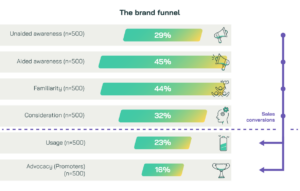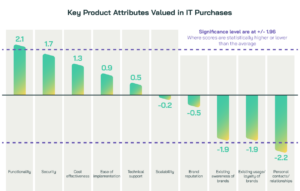At Vanson Bourne, we’ve always been curious over what’s important to decision makers when making IT purchases. A few years ago, we delved into this more deeply to understand more about the intrinsic link between brand research, alongside marketing campaigns and the B2B path to purchase journey for decision makers. This understanding has been critical in the development of our brand offering and naturally as researchers, we wanted to know, how have things changed? And are there new factors at play?
We surveyed 300 IT and Business decision makers (ITDMs and BDMs), across the UK and US, and asked them their thoughts.
So, what did we find?
Brand research is still crucial in B2B
Brand research remains important in the B2B space. With tighter budgets and a plethora of choices, understanding how your brand is perceived is more important than ever.
Nearly all (94%) believe that marketing activity, such as advertising, messaging, or content, impacts the buying journey. Specifically,

Loyalty takes a backseat
In the last 2 years, there’s been a shift in loyalty. Decision makers now find a brand’s reputation is more important to them than a feeling of loyalty to current suppliers.
Also, there’s complex emotions involved in the B2B purchasing journey. 93% reported experiencing various emotions during the buying journey, including:

Diving into the research findings…
The emotional journey of B2B buying
Our research also shows us that there’s a lot more emotions that go into the B2B buying journey than we realise. Besides curiosity, excitement, and anticipation, many also feel a sense of calmness, surprise and delight. Surprisingly, the feeling of bias (8%) is less experienced. Agreeing with the points made before, this is probably due to a current focus on business needs over existing connections.

The UK: Less Concerned with Old Ties Compared to the US
In case it hasn’t been made clear yet, reputation is influencing decisions more than loyalty or expectations for decision makers when looking outside of technical aspects (e.g., security, cost, technical support etc.). This is true for both ITDMs and BDMs, across both the UK and US.
Yet, there are some important differences by country. Those in the UK feel much stronger about the importance of the surveyed attributes, than the US. For instance, the UK reported existing awareness of brands, loyalty and personal relationships as significantly less important than the other attributes during past purchases.
However, despite the UK stating that personal relationships and connections are significantly less important to their buying process, they are more likely to report feeling bias than the US (14% and 4% respectfully). Perhaps this comes down to the UK’s stagnant economy, meaning the UK feel less willing to take the risk of new vendors as they don’t want to potentially lose money on an already tight budget. Is the UK caught in a catch 22 where they want to change vendors to save money, but can’t risk it failing and eventually losing money?
Why does this matter for your brand?
“The B2B buying journey is an intricate and complex process. With the wider pressures from the current economic climate and budget squeezes, brand loyalty is dying. Organisations are focused on the products and solutions that they need, not that they want, with brand reputation core to that. With marketing activity playing such a key part to the decision making on that journey, it’s more important than ever to be keeping tabs on brand performance”.
Albany Vincent, Associate Director (Research)
Our research has highlighted that in the B2B space, there’s been a shift in brand loyalty. This could be due to the turbulence the market is currently facing; budgets are being squeezed and many current solutions are being assessed, making loyalty less of a factor. Instead, decision makers are turning to other vendors, their decisions influenced by word-of-mouth reviews, online software reviews and analyst rankings.
What’s more, decision-makers are increasingly turning to research deliverables produced by vendors rather than relying solely on search engine visibility. Recent findings highlight that over the past two years, resources like company blogs, eBooks, research reports, and in-person events or conferences have shaped their vendor research and understanding process.
Visible marketing activities are swaying decisions making it essential organisations monitor their brand performance closely.
Now, the thought of branding being influential in the buying journey isn’t revolutionary or new, but it does make you think – how often is my brand considered? And is my current branding working?
The power of brand research
Brand research can help you understand where your strengths and weaknesses lie in relation to your key competitors, and identify opportunities you may have because of uncovering any marketing reach gaps; all of which helps to answer the all-important question: “How can our brand get ahead?”
 *Figure used is not real data and is for example of set up only
*Figure used is not real data and is for example of set up only
Overlaying key brand metrics (awareness, familiarity, consideration, usage and advocacy) will reveal where your brand excels or where there’s gaps. Done properly, it provides actionable insight to support brand development and optimal go-to-market strategies.
So, what next?
It’s not enough to rely on your current customers to remain loyal to your organisation. Decision makers no longer feel a sense of loyalty or bias towards their existing relationships, and in the current climate show clear willingness to move to support their business needs.
Creating a strong brand reputation can be created through having useful content available for potential customers, and ensuring all current customers are continuously advocating for your brand.
Having a true view of your competitive standing will help you get ahead with your marketing and allow you to truly tailor it to your target audience. Ultimately, ensuring all your users are true advocates of your brand.
I want to know more about brand research, where should I go?
Let’s talk! We can help you understand more about what brand research can offer. We can help you prioritise marketing initiatives, understand your brand awareness, and succeed in a competitive landscape.
Here’s some follow up links if you want to keep reading around the area:





